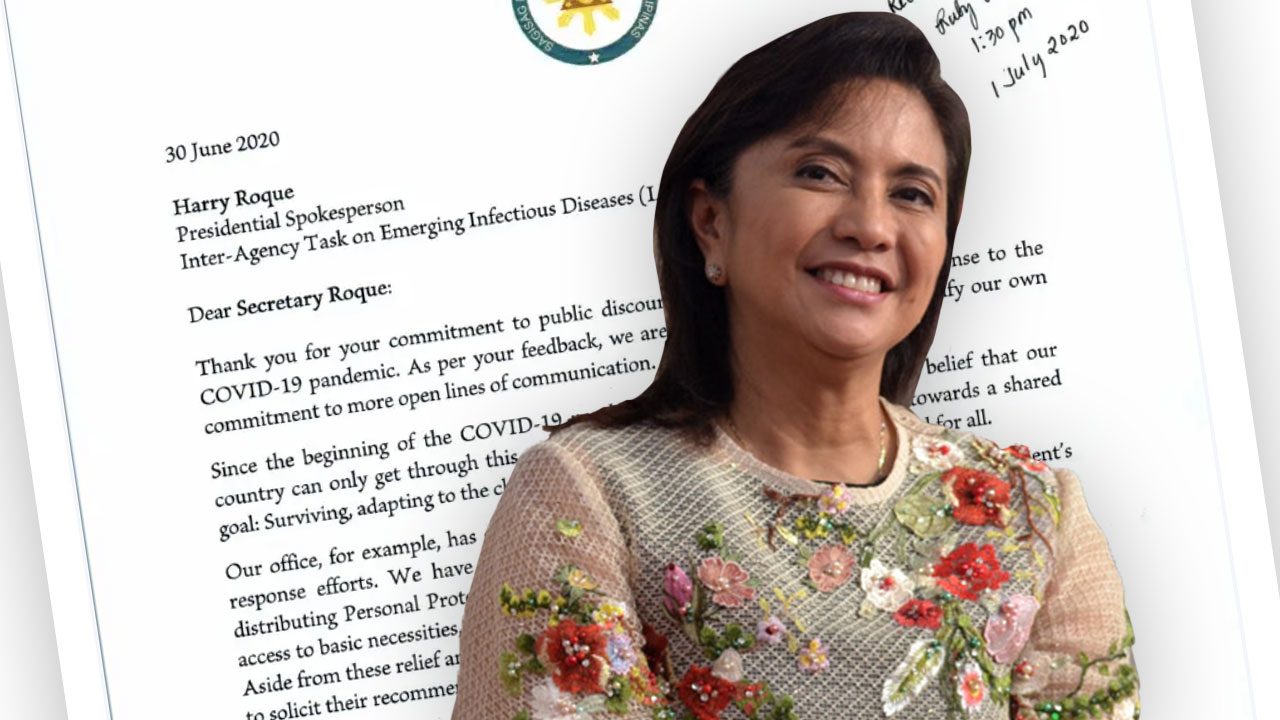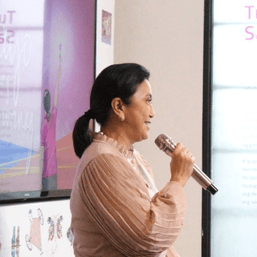SUMMARY
This is AI generated summarization, which may have errors. For context, always refer to the full article.

Vice President Leni Robredo said President Rodrigo Duterte’s government can improve its response to the coronavirus pandemic if the administration hinges it on accurate data, puts a premium on transparency, and ensures coherence of policies across departments.
Robredo publicized on Monday, July 20, a copy of the letter she wrote to Presidential Spokesperson Harry Roque on June 30, specifying her concrete suggestions to improve the way the government is battling COVID-19.
The 8-page letter contained comprehensive recommendations to reform 6 key aspects of the pandemic response:
- Reporting of data and keeping the public informed of the government’s actions
- Budget utilization
- Transportation concerns
- Restarting the economy
- Education
- Composition of the Inter-Agency Task Force (IATF) on Emerging Infectious Diseases
The Vice President drafted her suggestions after consulting with health experts, data analysts, educators, economists, advocates, and experts on the national budget.
“Defeating COVID-19 and promoting the health and welfare of our people are priorities we all share. In this light, we look forward to wider avenues of cooperation, more positive and transparent ways of engaging the public, and even more urgent action on our observations. We are grateful for the opportunity to have our recommendations considered,” the Vice President said.
From making more harmonized policy announcements to preparing students, teachers, and parents for distance learning, here are Robredo’s suggested ways to fix the country’s response to COVID-19:
Duterte should continue giving weekly reports
The now-expired Republic Act No. 11469 or the Bayanihan to Heal as One Act required the President to update Congress every week on what the government is doing to fight the COVID-19 pandemic.
Robredo said Duterte should still continue releasing weekly reports, but pointed out the President should clearly specify the following:
- Summary of what transpired during the previous week and highlight gains, targets met, and targets missed
- Targets for the coming week
- Targets for succeeding weeks and how these all fit into an overall plan
The Vice President said specific data must also be provided, including programs and their indicators for success, the number of target beneficiaries and the number of those who actually received the aid, and total funds allotted and disbursed for different programs.
Announce policies only when all concerned agencies agree on them
Robredo said all concerned agencies must build consensus first before announcing any new policies. Otherwise, it causes “confusion and misrepresentation.”
She zeroed in on the case of locally stranded individuals, who were initially told their travel was suspended. The policy was then changed to say that they can return to their provinces only after undergoing a swab test.
Finally, the national government clarified that travel for stranded individuals is suspended in specific regions only and that swab tests will no longer be required.
“This [sequence] of announcements [was] released within a span of 24 hours. They created confusion and only served to delay the delivery of services that our people badly need,” Robredo said.
“All of these could have been avoided had the announcement come after a quick but robust consensus-building process among relevant agencies,” she said.
Let the public monitor pandemic funds, loans, and donations
Robredo suggested the creation of an online portal where Filipinos can easily monitor the funds loaned by the government and the donations the country receives to augment its battle against COVID-19.
She argued that transparency is the best answer to multiple accusations of irregular spending during the pandemic.
Robredo said local government units should regularly report the status of COVID-19 funds.
The Development Budget Coordination Committee should also release detailed Budgets of Expenditure and Sources of Financing tables for COVID-19, similar to what is being done for the annual national budget.
Adopt a service contracting system and e-payments for public transportation
Robredo backs the key transportation reforms proposed by the MoveAsOne Coalition to help public utility vehicle drivers (PUV) adjust to life during the pandemic.
She said there must be a shift to a service contracting system, where PUV drivers are given a fixed monthly salary. Contactless forms of payment should be adopted, too.
“This will prevent them from overcrowding their vehicles just to meet their boundaries, and encourage stricter adherence to social distancing,” Robredo said.
The Vice President also backs the installation of more sidewalks and safe bike lanes. (READ: DOTr urges LGUs: Develop more facilities to make biking safer)
Ease the burden on jeepney drivers and operators
Robredo recommended that jeepneys be allowed to ply roads again, as long as physical distancing rules and minimum health standards are enforced.
Operators should also be granted affordable loans so they could comply with the jeepney modernization policy.
“The prohibition of jeepneys took a huge toll on commuters because of the lack of public transportation. Likewise, it adversely affected jeepney drivers and operators who did not have income for more than 3 months,” Robredo said.
Be clear with protocols for locally stranded individuals
Robredo recommended a “thorough review” of existing policies in helping locally stranded individuals go back home.
The guidelines should be clear so people can clearly understand them, including what they need to do and where they should go if they choose to return to their provinces. (READ: ‘Walang malapitan’: Stranded ‘probinsyanos’ feel abandoned by Duterte gov’t)
If trips are cancelled, the Vice President said temporary facilities should be created to house stranded individuals.
Implement a bus system with fixed routes, stops, and times for arrival and departure
Robredo said one thing that her office’s free shuttle service for frontliners proved is that “it is possible to have a predictable and reliable bus system in Metro Manila.”
The Vice President said the government can explore implementing a system where buses have fixed routes, stops, and schedules for arrival and departure.
Pass the P1.3-trillion Arise Philippines bill into law
Robredo said the proposed P1.3-trillion stimulus package in the House would help restart the economy by helping small businesses get back on their feet.
The Vice President said the following are just some of the programs that the proposed Accelerated Recovery and Investments Stimulus for the Economy of the Philippines or ARISE Philippines bill can fund if passed into law:
- P110 billion for wage subsidies
- P30 billion for cash-for-work programs
- P10 billion assistance for micro, small, and medium enterprises
- P58 billion to boost tourism sector
- Loan extensions through the Department of Finance and the Bangko Sentral ng Pilipinas
Education policies should be ’empowerment-oriented, empathy-driven’
If the government will push through with a distance learning scheme in the upcoming school year, Robredo said learning and teaching modalities should adjust to what is actually happening on the ground.
For example, face-to-face classes should still be considered in areas with low connectivity levels and with no recorded cases of COVID-19.
Robredo said the government should also ensure connectivity in all barangays. She suggested putting up community learning hubs, where students can access the internet for their online classes and also receive tutorial support.
The Vice President also suggested establishing a system so disadvantaged students are the first ones to receive free gadgets and digital devices. (READ: Decline in enrollees: Parents cite finances, doubts about distance learning)
Parents and teachers must also be given the tools and resources so they are properly equipped to guide students during online classes.
“Innovative ways to allow our children to continue learning despite the pandemic are urgently needed. Likewise, education policies should shift to an empowerment-oriented and empathy-driven mindset, rather than a regulatory one,” Robredo said.
Include local government officials and experts in IATF
Robredo said the IATF membership can be expanded to include representatives from the leagues of provinces, municipalities, cities, and barangays.
She also wants data scientists, health experts, and economists to be a part of the body that decides on the policies being implemented to fight the pandemic.
“This will ensure that a truly whole-of-nation approach is used in creating policies that are not only acceptable, but ultimately empowering to the entire spectrum of society,” the Vice President said.
Read a full copy of Robredo’s recommendations to improve the country’s COVID-19 response below:
– Rappler.com
Add a comment
How does this make you feel?


![[Newspoint] A fighting presence](https://www.rappler.com/tachyon/2024/07/thought-leaders-a-fighting-presence.jpg?resize=257%2C257&crop=441px%2C0px%2C1080px%2C1080px)
![[Closer Look] ‘Join Marcos, avert Duterte’ and the danger of expediency](https://www.rappler.com/tachyon/2024/06/TL-trillanes-duterte-expediency-june-29-2024.jpg?resize=257%2C257&crop_strategy=attention)

There are no comments yet. Add your comment to start the conversation.